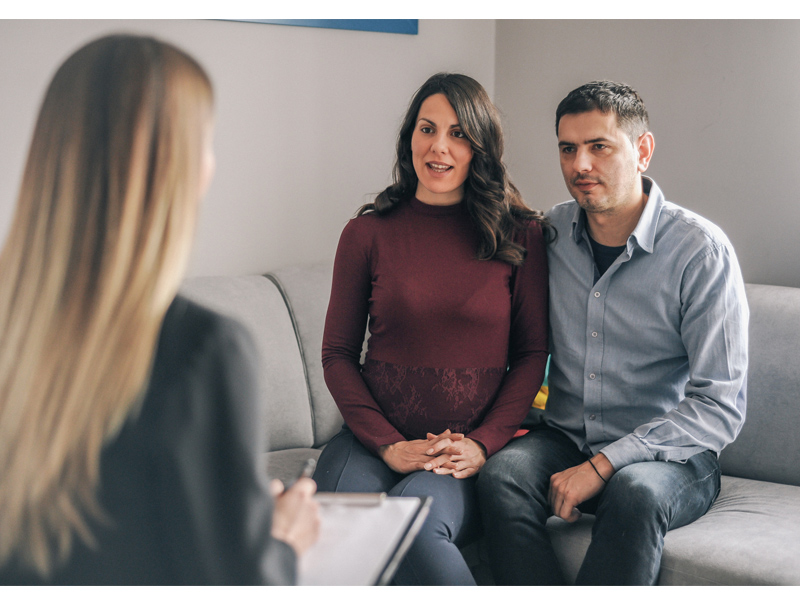Do happy couples seek relationship therapy?
We see personal trainers to boost our fitness and doctors to stay healthy, so why not a counsellor for a good relationship? Here’s when you should consider it.
Relationship issues might be the most common reason why Australians seek counselling, but research shows many couples experiencing difficulties don’t seek professional help – especially those from a low-income background.
“The way relationship counselling has traditionally been portrayed by pop culture means it can seem embarrassing or like an admission of failure to reach out for professional help,” Relationships Australia’s national executive officer, Nick Tebbey, says.
Victorian-based certified life and relationship coach Megan Luscombe adds that couples might also feel like they shouldn’t need it.
“We understand the importance of seeking support for so many other things in life, yet we’re often so open to being in a relationship without the proper tools to navigate the trials and tribulations that are going to come,” Megan says.
“Plus, we all tend to seek counselling about our relationship in some way, shape or form anyway, be it talking to friends or listening to a podcast.
“So what’s the harm in sitting down in front of someone who’s completely non-biased to your situation and can actually really help you?”
- Different pages: Could learning your ‘love language’ improve your relationship?
Seeking help too little, too late?
Another issue Nick raises is the misconception that counselling should only be sought as a last resort.
“I think a lot of people do view relationship counselling that way, seeing it as something you do when you’ve tried everything else,” Nick says.
“You feel like all hope is lost and it’s your last roll of the dice to fix things.”
Interestingly, it’s worth noting the findings of an Australian Institute of Family Studies report.
Highlighting the fact that relationship counselling doesn’t work for 25-30 per cent of couples who attend, the report found that it was couples who experienced the highest levels of distress that tended to have poorer counselling outcomes.
In line with that, Megan stresses the importance of being proactive rather than reactive. “Preventative coaching and counselling is the best way to tackle any relationship growth,” she says.
“And the more proactive you are at seeking help in the early stages of your relationship, the more prepared you’ll be for when issues arise – and they will.”
- Tension diffuser: 6 ways to resolve conflict in relationships – fast
When should you seek help with your relationship?
There’s not one, clear answer to this, but Nick identifies communication as a good reason to work with a counsellor.
“So where there’s some sort of barrier to open and honest communication within the relationship, whether you’re struggling to communicate or you feel like your partner is with you,” he says.
“But you could also ask yourself a few questions like ‘am I satisfied?’, ‘do I feel like I’m giving my all to this relationship?’ and ‘do I feel like I’m receiving everything I need from my partner?’
“If you think things could be better then that’s also a good opportunity to see whether counselling might help you unlock the full potential of your relationship.”
Megan adds that encountering relationship milestones, like buying a house together or deciding to have children, can be another good opportunity.
“Any situation that puts your relationship under a bit of stress is a great opportunity to say ‘hey, this is pretty big for us, how about we talk to somebody and navigate this positively’, because apart from anything else, you end up taking those learnings into the next situation.”
Secrets of success in relationship counselling
While there’s nothing specific you should or need to do to prepare for a relationship counselling or coaching session, bearing the following facts and suggestions in mind might help.
- You’re not going to be judged. Nick says this is another myth that surrounds counselling.
“The idea that you’ll be sitting across from a professional who’s going to pass judgment about the state of your relationship or make a decision about who’s right and who’s wrong is just false,” he says.
Megan agrees. “Counsellors, coaches and therapists are trained not to be judgmental,” she says.
“We’re completely neutral and are there to help both people out.”
- Go in with an open mind. “Try to set aside ego and any preconceived ideas of what’s right and what’s wrong,” Nick says.
“Be open to sharing your own views and feelings and open to hearing other perspectives.”
- And be prepared to be yourself. “Radically yourself,” Megan says.
“That’s the most important thing when it comes to working with a coach or a counsellor – we want our clients to be exactly who they are.”
Written by Karen Fittall.






